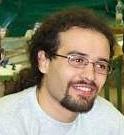 Here is my First Impression about UR, the new What's Your Game by Paolo Mori. This article soon will appear also in BoardGame News. I have just played one game in 4 players with a final version prototype.
Here is my First Impression about UR, the new What's Your Game by Paolo Mori. This article soon will appear also in BoardGame News. I have just played one game in 4 players with a final version prototype.You can download the rules here.
UR is a game settled in the ancient Mesopotamia. Every player takes the role of one of the populations living there and trying to develop through agriculture, wars, culture, politics, trades and also building Ziggurats.
The one that is most able to evolve in all these aspects will probably be the winner.
UR is a game played over a square grid of tiles representing the 5 'actions': agriculture, culture, war, trade and politic. Every tile has one of these five actions on each side: the action represented on the upper face determines what could happen in that tile. The game turns acts like this: the player can use both the actions represented on the tile he has in hand, occupying turn after turn the tiles with their tokens and then replacing one of the tiles of the board with the one in their hand. This continue until all the five Ziggurat have been built, or until there are not empty tiles on the board. At the end of the game, players score according to the number and type of tiles they occupy.
The tiles act both as the map and as the cards determining the actions you can perform on the following turn, according to the aspects on both sides of the tile. Replacing an empty tile in the map with the one you have just used in your turn allow you to act on the map changing it. You also have to choose the actions you could carry out in the following turn one turn before, allowing the other players to react properly to that.
The game mechanic is really nice and, as far as I know, quite original. The five aspects (and so the 5 possible actions) are really different. Agriculture makes your population grown on tiles with agriculture; Culture makes population grow on tiles adjacent to culture tiles; Trade makes population grow on the trade tiles according to the number of neighbours; Politics let you reorganize all your populations and Wars let you move and conquer new tiles. Instead of making one action you can just add one token on one of yours tiles. Skipping both actions let you place a token on an empty tile.
Despite the abstractness the game well simulate the developing of the civs: in the beginning there is a race for the Agriculture tiles or just trying to surround cultural tiles with your tokens. In the second stage you need wars and trades to expand and keep improving. Since you are not allowed to place more than 20 tokens on the map soon you discover that you need wars and politics to reorganize your population. Building up a Ziggurat can also be useful to remove five ore more tokens from the map.
In my game we all fought for the agriculture and culture tiles in the beginning and than we raced for the building of Ziggurat. The game could finish suddenly because it is possible that 3 or 4 Ziggurat are built in the same turn.
I quite enjoyed my first game at UR and for sure I would like to play it again although is not really the kind of game I used to love. The main perplexity is about the strategy to use for winning: it is not easy to understand when is the time to stop growing and start spreading. In the end we really don't understand why one of us was the winner and what (and when) really he has done we haven't during the game. The designer himself told me that the learning curve of UR is quite steep and so i definitely need to play more games to have a clear idea.
Good play!
Liga

No comments:
Post a Comment